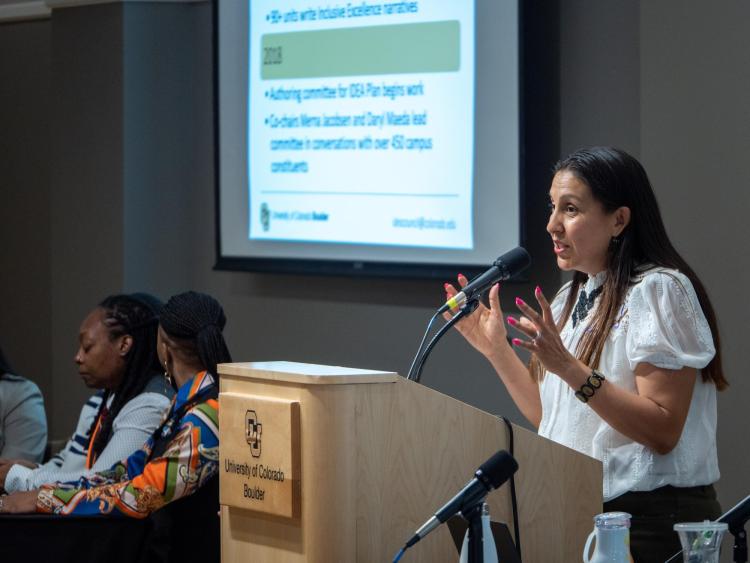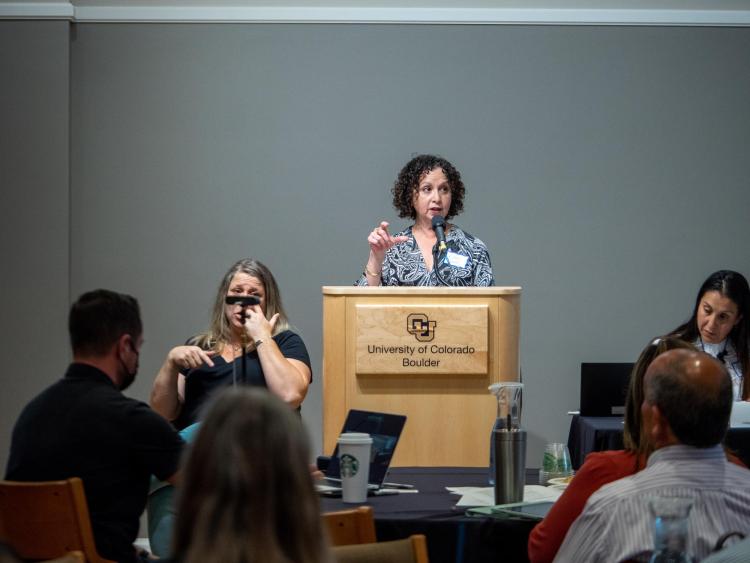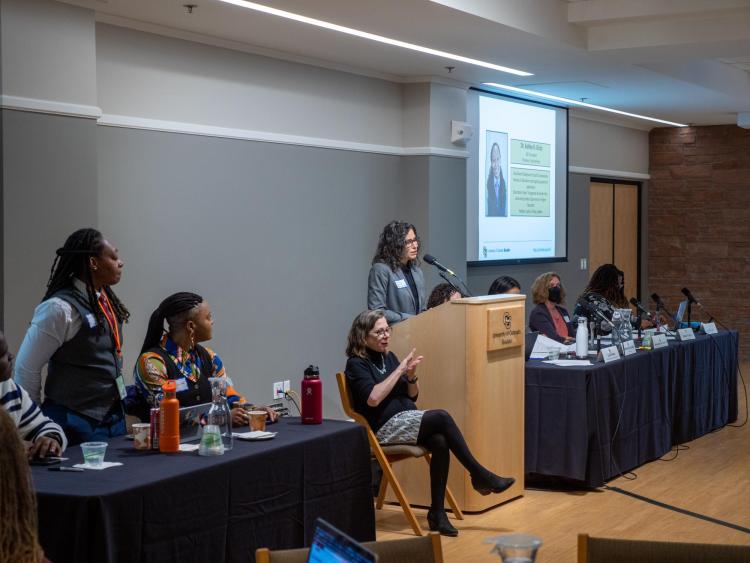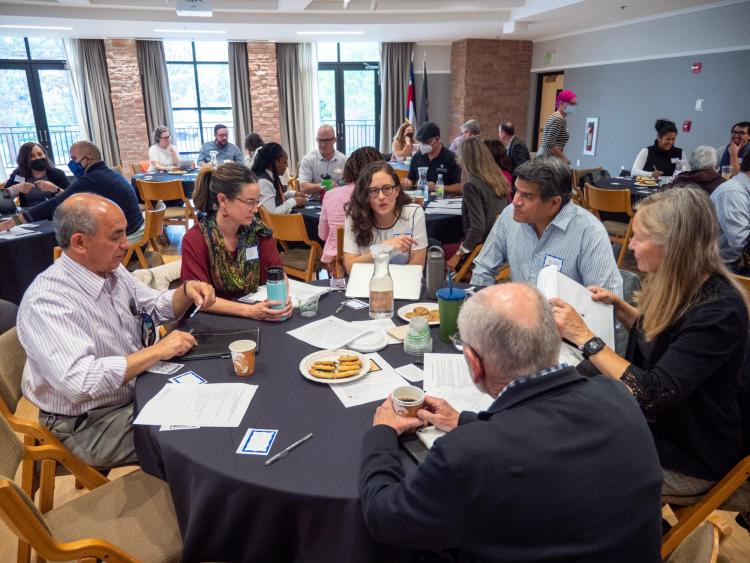Diversity, equity and inclusion update: May 2022 issue
Editor’s note: This is part of a monthly series of campus updates on diversity, equity and inclusion that will continue throughout the year.
[anchors selector="#content h2" title="In this issue" /]
IDEA Council holds first public forum on campus
The IDEA Council, the campus body charged with prioritizing recommendations in the Inclusion, Diversity and Excellence in Academics (IDEA) Plan, met with students, staff, faculty and campus leaders on May 23 during its first public forum.
Sixty-three members of the campus community attended the event in person at the University Memorial Center, and 247 people attended via Zoom. Also in attendance at the UMC were Provost Russell Moore, COO Patrick O’Rourke and other campus leaders.
Attendees received an overview of the council’s mission and work to date, the five DEI goals inspired by the IDEA Plan, and recommendations for the upcoming academic year based on input from undergraduate and graduate student leaders and groups. Council leaders also announced a renewed focus on supporting faculty and staff as the campus advances its support for diversity, equity and inclusion (DEI) initiatives going forward.
Panelists included council co-chairs Lisa Flores, a professor of communication and the associate dean of diversity, equity and inclusion in the College of Media, Communication and Information, and Teresa Hernández, talent acquisition diversity, equity and inclusion recruitment program manager in Human Resources.
“The IDEA Council forum was intended to share the work we have accomplished and to hear from the campus community regarding their thoughts and ideas to further inclusion on the campus,” Hernández said. “The attendees’ presence and support—both in person and via zoom—is inspiring and speaks to these campus members’ investment and willingness to keep learning and pushing ourselves to further inclusion initiatives on campus.”
Susan Thomas, a professor of musicology, director of the American Music Research Center and associate dean for DEI in the College of Music, and Jasimine Evans, student services outreach lead in Career Services and a Staff Council co-chair, also spoke about the council’s work during the two-hour public forum.
Senior Vice Chancellor for DEI Sonia DeLuca Fernández formally introduced the campus’s senior DEI consultants Teshia Koffi and Fabiola Mora and DEI consultants Ashley Grice and D’Andre Coats. DeLuca Fernández and her team will work with the leaders of 34 campus planning units—programs, schools, colleges and administrative units—to advance CU Boulder’s DEI priorities and the IDEA Plan recommendations.

Teresa Hernández, co-chair of the IDEA Council, speaks at the council’s public forum.

Lisa Flores, co-chair of the IDEA Council, speaks at the council’s public forum.

Sonia DeLuca Fernández, senior vice chancellor for diversity, equity and inclusion, introduces the campus’s DEI consultants during the public forum.

Staff members from the Office of Diversity, Equity and Community Engagement and the Office of Data Analytics discuss diversity, equity and inclusion strategies with Provost Russell Moore at the public forum.

Staff and faculty members participated in group breakout sessions at the public forum.
DeLuca Fernández also provided attendees with an overview of the campus’s next steps for promoting DEI following the Campus Culture Survey. DEI consultants from her office will meet with unit leaders to prioritize their unique goals and to develop action plans, which is part of a broader effort by the CU system to create more inclusive campus communities.
The DEI consultants will work with the campus’s 34 planning units “so we can develop a timeline for synthesizing action plans,” DeLuca Fernández said in response to a question from the audience. “This is going to be a practice of how we advance DEI.”
During the past two years, the IDEA Council has focused on recommendations in support of the recruitment, retention and success of students, staff and faculty from minoritized and historically underrepresented groups. This past academic year, members met with student government and other undergraduate and graduate student leaders to gauge their views on how the university administration should work to support DEI priorities on campus.
“IDEA Council work has meant being methodical and strategic in our approaches,” Hernández said. “That means being attentive to the voices of students and other subject matter experts on campus to determine recommendations that should be prioritized from the IDEA Plan.”
Based on the feedback they received, the council shared what they deem to be the university’s highest priorities to support undergraduate and graduate student success in alignment with IDEA Plan recommendations. Members voted on and approved the following priorities to support undergraduate student success:
- Regularly assess and build opportunities to improve campus climate for undergraduate students (IDEA Plan, recommendation No. 8)
- Grow infrastructure from CU and deepen the donor base to support historically marginalized communities (IDEA Plan, recommendation No. 3)
- Support, scale and increase the programmatic efforts of the CU Lead Alliance (IDEA Plan, recommendation No. 1)
- Improve outreach and engagement with K-12 grade students from under-resourced communities and with community colleges in Colorado and beyond (IDEA Plan, recommendation No. 4)
Council members are also discussing the following additional recommendations to support graduate student success:
- Recruit diverse graduate, postdoctoral and professional students (IDEA Plan, recommendation No. 13)
- Improve and increase health care coverage and mental health services (IDEA Plan, recommendation No. 14)
- Implement targeted measures to improve campus climate for graduate and professional students (IDEA Plan, recommendation No. 12)
- Invest in formalized graduate student and professional student peer and advisor mentoring (IDEA Plan, recommendation No. 11)
Council members, who represent a cross-section of schools, colleges and administrative departments across campus, convened for the first time in late 2020 and have issued recommendations on a variety of initiatives to promote greater diversity, equity and inclusion at CU Boulder. Recently, for instance, a council recommendation led to the expansion of all-gender bathrooms on campus, and another will provide support for faculty and staff affinity groups on campus during the upcoming academic year.
Colorado celebrates Juneteenth as an official state holiday
CU Boulder and Colorado will celebrate Juneteenth next month as an official state holiday. Traditionally observed on June 19, Juneteenth recognizes the emancipation of enslaved African Americans and the self-determination of Black Americans. It became a state holiday on May 2 when Gov. Jared Polis signed a legislative bill into law.
On the CU Boulder campus, University Libraries has assembled an online resource guide to share more about the holiday. Denver’s historic Five Points neighborhood will hold its annual Juneteenth celebration, June 17–19, and the Center for African and African American Studies (CAAAS) and CU Athletics will table at the celebrated annual event. Across Boulder County, several communities will mark the holiday on June 16.
Juneteenth marks the date in 1865 when the Union Army arrived in Texas, the last state in the Confederacy with institutional slavery, to proclaim freedom for enslaved people—more than two years after President Abraham Lincoln’s Emancipation Proclamation.
Colorado will begin observing Juneteenth as a state holiday this year. When the holiday falls on a weekend day, as is occurring this year, the state will observe it on the following Monday.
The university will offer Juneteenth as a floating personal observance day for all leave-eligible faculty and staff, who can take the time off between now and Dec. 31 in consultation with supervisors, campus human resources officials said. This flexibility will accommodate faculty, staff and students involved with the summer session, which begins May 9 and is part of the current academic calendar.
In the months ahead, the four CU campuses and the university’s system office will determine how to implement this additional state holiday into academic calendars. Details on a personal day of observance for Juneteenth for fiscal year 2023 will be forthcoming.
More information is available on the Human Resources website.
UndocuAlly sessions set for the summer
The Center for Inclusion and Social Change has scheduled summer UndocuAlly Zoom sessions for staff, faculty and students with administrative or teaching roles.
Participants will learn more about the makeup of the campus’s undocumented community and the history of U.S. immigration and gain a greater understanding of the challenges, opportunities and resources available to undocumented students.
Participants will also learn more about the federal Deferred Action for Childhood Arrivals (DACA) and Colorado’s Advancing Students for a Stronger Economy Tomorrow (ASSET) and how these programs affect CU Boulder students.
Sessions will take place from 9 to 11 a.m. on June 15 and from noon to 2 p.m. on July 22.
More information about how to register is available on the ODECE website.
Sustaining our practice of inclusion
Campus efforts and investments to address pressing and painful inequities at CU Boulder are only a beginning. Creating a culture of belonging will take each member of our community practicing sustained personal work to truly embrace and support diverse perspectives and identities in our community.
This year, Chancellor Philip DiStefano and other campus leaders urge every member of our community to join in learning more about diversity, equity, inclusion and anti-racism and to work continuously together to address these challenges more actively and in ways that can help authentically transform our campus culture in the coming year.
Campus resources
- Center for African and African American Studies (CAAAS): Provides a focal point for Black community and culture at CU Boulder and a multipurpose space where scholars, students, artists, activists and allies come together to study Africa, African Americans, and the African diaspora. Subscribe to the center’s newsletter to learn more.
- Center for Asian Studies: Strives to be a space of community, curiosity and respectful engagement with Asia, views the area studies endeavor as a necessary yet distinct complement to disciplinary knowledge, and recognizes the historic and geographic centrality that Asia has and continues to play in the human venture.
- Center for Native American and Indigenous Studies (CNAIS): Promotes collaborative research focusing on local and global Indigenous knowledge and fosters projects that aspire to open conversations in Colorado and the world.
- Center for Teaching and Learning: Offers programs focused on creating inclusive classrooms and supports CU’s community of educators through free consultations, teaching resources, programs, seminars, workshops and other events.
- CU Boulder History Project: Seeks share CU Boulder’s history based on intersectional perspectives to demonstrate our commitment to inclusive excellence and to deepen our institutional memory.
- Latin American Studies Center: Provides an institutional space for research, teaching and discussion on Latin America and Latinx/Latina/Latino studies.
- Office of Diversity, Equity and Community Engagement: Supports programming, events and campuswide initiatives for students, faculty and staff that promote diversity, equity and inclusion. Subscribe to the office’s newsletter to learn more.
- Research and Innovation Office (RIO): Offers resources focusing on diversity, equity and inclusion in research and innovation.
- University Libraries: Provides a rich assortment of diverse reading materials and other resources, events and initiatives for students, faculty, staff, alumni and Colorado residents.
- Wrap-up of the campus’s 2020–21 DEI initiatives is available online and includes additional campus resources.
In case you missed it


